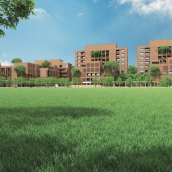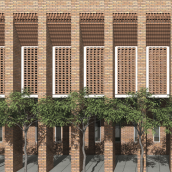Classes resuming
Classes will resume for the new term at the Aga Khan Academy Maputo on 16 January.
School closed
The Aga Khan Academy Maputo will be closed on Monday, 1 May 2023 and will resume on Tuesday, 2 May 2023.
Enrichment Programmes
The enrichment programmes for the present term at the Aga Khan Academy Maputo will resume on Thursday, 22 February 2024.
Extra-curricular activities
Extra-curricular activities will begin on 14 February. For more details, please contact Academy's secretaries.
Extra-curricular activities
Extra-curricular activities will begin on 19 September. For more details, please contact Academy's secretaries.
AKA Maputo Construction Diary May 2019
See the May 2019 construction progess at the Aga Khan Academy Maputo campus.
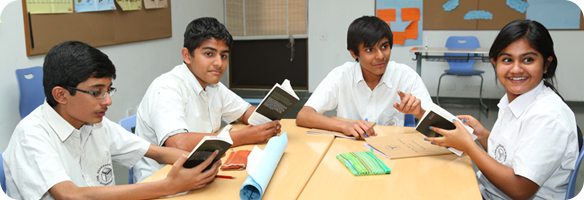
Middle Years Programme
The Senior School of the Aga Khan Academy Hyderabad is an authorised International Baccalaureate (IB) World School offering the Middle Years Programme (MYP).
We offer the IB Middle Years Programme for students in grades 6–10 as part of an integrated curriculum that includes the Primary Years Programme (grades 1–5) and the Diploma Programme (grades 11–12).
The MYP covers a study of the major disciplines, including:
- languages
- sciences
- literature
- social sciences
- mathematics
- arts
- technology
- physical education.
The five Aga Khan Curricular Strands, which are unique to the Aga Khan Academies, are integrated throughout the curriculum.
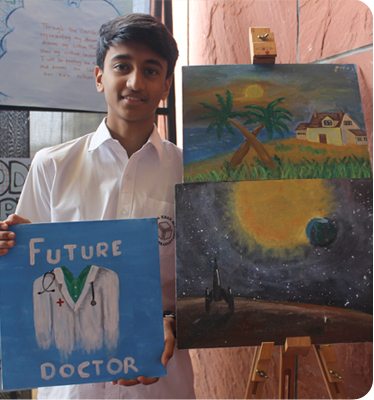 Learning through the MYP
Learning through the MYP
Our MYP students are immersed in a challenging and enriching educational environment. We ensure that they master basic skills, develop the ability to analyse and think critically, and become computer literate. We also emphasise the development of self-discipline and good work habits.
The programme encourages students to reflect on their learning and make connections with real world issues. It also helps students develop an awareness of their thought processes and learning strategies, and of how they learn best.
The MYP includes a service component that makes students aware of community and global needs. We also ensure that each student has a strong leadership experience and receives grounding in ethics, which helps prepare them for future leadership roles.
The final performance of our MYP students is assessed by teams of teachers and is validated by the IB through a monitoring process that ensures the high standards of IB schools worldwide.
MYP – grade 10 equivalence
In January 2013, the Association of Indian Universities signed an agreement with the International Baccalaureate to equate the completion of the Middle Years Programme with grade 10 of an Indian board assessment. This agreement now allows students who complete the MYP to apply for admission for higher studies to any school in India.
For further information about applying to the MYP at the Academy, please see the admission requirements or contact us.
Pinto Belo João: A determined teacher and a collaborative planner
“Being a teacher is not easy, because we have to teach and learn every day. I chose a career in teaching because I like to share what I know with others, especially young people, to help them to overcome the challenges in life. Being a teacher is like taking care of something special, so I decided to take care of that special thing, walking together in order to discover the world around us.”
Pinto Belo João is a grade 2 teacher at the Aga Khan Academy in Maputo. Born in Maputo, Mozambique, Pinto attended a teacher training course in Matola in 2007 where he became a primary teacher and then attended Pedagogical University in 2011 to study education. He came to the Academy as part of the Teacher Preparation Programme (TPP), which was established by the Aga Khan Academies to train recent teacher graduates to become International Baccalaureate (IB) teachers.
“Honestly I didn’t know many things about the Academy before I joined, but I always was eager to learn and grow professionally,” says Pinto. Through the Aga Khan Academy, Pinto says he has grown professionally in terms of learning new approaches to teaching and learning, trying new things and giving himself a chance to learn more. “Through professional development, the Academy helped me become a more effective teacher and a collaborative planner,” he says proudly.For Pinto, the most rewarding aspect of the Aga Khan Academy is teaching while surrounded by experts. This environment has given him the opportunity to try new things and granted him time to reflect on teaching strategies. This has been both valuable and powerful for Pinto as it allowed him to share experiences related to classes and receive guidance and support from others. What Pinto really likes about the Academy is the integration of the Aga Khan Curricular Strands. “In my opinion these Strands make us unique and different from others,” he says.
Reflecting on enlightening experiences at the Academy, Pinto narrates a particular day when he was teaching mathematics through games. He says that while he was giving instructions on how to play the game he was surprised to see the students already playing the game before he could even finish explaining. “I learned something that day: we should never underestimate our students. Sometimes we think that we have to teach something, but the students already know it. We need to be careful in our approaches,” Pinto remarks.
In this way, Pinto has learnt profoundly from his students and feels that the teacher-student relationship, reinforced by trust, is of the utmost importance. “We need to establish trust so that the process runs toward success both inside and outside the classroom,” he says.Relationships in the classroom must also involve parents – Pinto knows the importance and necessity of parental involvement in the education of their children. He regularly updates the parents about what they do in class and about their school trips – he also ensures that he shows parents the newsletter with stories of learning from the classroom. Some of the homework Pinto assigns includes parent personal experiences that they can share with their children.
At the Academy, Pinto says they try as much as they can to involve all students in activities and give each of them a role in groups to make them appreciate each other’s abilities. “By promoting activities like social community, [this] makes the students reflect on their own actions,” he remarks. Pinto explains that students come from different backgrounds and nationalities and that this is what makes the residential environment multicultural and promotes pluralism. When the students are exposed to this environment, Pinto says, “They learn more from each other and respect diversity. It is a great experience for them.” Ensuring a climate of pluralism on campus is not an easy task, Pinto says. “But through student’s responsibilities, we can ensure that they are working together.”
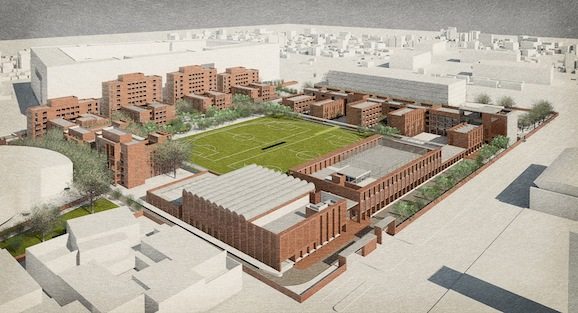
The Aga Khan Academy Dhaka
“This new Academy will be an important node in a network of 18 schools throughout the developing world, providing world class education for young men and women from all backgrounds, irrespective of ability to pay. It will be a remarkable place to go to school.”
His Highness the Aga Khan, Dhaka, Bangladesh, 20 May 2008
Introduction
The award-winning Aga Khan Academy Dhaka represents a significant investment in education by the Aga Khan Development Network for the benefit of Bangladesh. It will become a new national asset for the whole country – and for its broad educational community.
This not-for-profit school will be part of an integrated network of Aga Khan Academies located across 14 countries. The Academy is being established to provide exceptional students with an outstanding education to prepare them for leadership roles in Bangladesh and across the world. Students are selected based on merit, regardless of socio-economic background, gender, race or religion. This ensures that talented students from all sectors of Bangladeshi society can access a world-class education.
Through its Professional Development Centre (PDC), the Academy will also act as a regional hub for academic innovation and excellence. The PDC is dedicated to training new teachers to the highest standards while offering veteran teachers the opportunity to stay on the cutting edge of education through research and practice. This expertise is then shared to enhance teaching and learning at government and other schools.
Award-Winning Design
The Aga Khan Academy will be located on a 20-acre plot in Bashundara, Dhaka and will enrol 750 students (K–12) with a capacity to expand to 1,200. Residential facilities will be provided for students and staff to allow for wide participation and enable a diverse learning community. The school has been designed by renowned international architects to ensure the best possible educational experience in a physical environment that resonates with local Bangladeshi culture and architectural traditions.
The design for the Aga Khan Academy Dhaka received the award for best ‘Future Education’ project at the World Architecture Festival 2017, held on 15-17 November in Berlin, Germany. The award recognises the excellence of the school’s design as well as the project’s intention to generate positive social impact, which arises from the mission and values of the Aga Khan Academies and the wider Aga Khan Development Network (AKDN). The vision of the Academies is to develop future leaders with the skills and knowledge to positively support development in their own societies.
Construction of the Academy begun in 2018, with classes for students planned to start in 2020.
Educating Future Leaders
The Aga Khan Academy in Dhaka will develop leaders with a pluralistic sensibility – individuals who are proudly Bangladeshi yet also connected to the larger, cosmopolitan world. The Academies programme, which is based on the highly regarded International Baccalaureate (IB) curriculum, prepares students to succeed in a globally competitive world while also connecting them to their own language, literature, history and heritage. As they grow to take on leadership roles, this education uniquely prepares them to address the issues facing their communities with solutions that draw on global best practices and are appropriate to the local context. As language is essential to leadership, the Aga Khan Academy will provide bilingual education in English and Bangla, ensuring that students maintain strong ties to their roots. Service learning projects also cultivate the ethic of serving one’s community. In helping their neighboring communities, students are exposed to the challenges they face and learn to come up with contextually appropriate solutions.
Global Linkages
The Aga Khan Academy Dhaka will be the fourth school in a planned network of 18 campuses in Africa, South and Central Asia, and the Middle East, following Mombasa (Kenya), Hyderabad (India) and Maputo (Mozambique). Academy teachers and students will be able to collaborate across this network via technology to share experiences with others from different cultures. Teacher exchanges between schools provide exposure to different learning environments and opportunities to share best practices with colleagues. Student exchanges between schools are also planned to allow them to experience another culture first hand and further their experience of living in a pluralistic world.
International Partners
Education at an Aga Khan Academy is enriched by unique academic and co-curricular partnerships. The Academies work closely with AKDN agencies across many areas including for curricular innovation and to offer students in-depth service learning and internship experiences. Partnerships with internationally renowned institutions contribute to the quality of the Academies’ curriculum and professional development programmes, and ensure that the Academies maintain and enhance their international standing. Partners include the International Baccalaureate, the University of British Columbia, Concordia University, the Government of Ontario (Canada) and Microsoft, with the Academies in Mombasa and Hyderabad having both been recognised as Microsoft Showcase Schools.
Videos
The Aga Khan Academy Maputo is committed to developing future leaders by delivering Excellence in Education. We offer merit-based admission to our International Baccalaureate (IB) programme at our purpose-built world-class campus in Maputo, Mozambique. Watch our newly released video to learn more about our unique offering.
The International Baccalaureate featured the Aga Khan Academies and our approach to creating home-grown leaders as part of their 50th anniversary commemoration. Watch to learn how the Academies work to transform the communities in which they are located.
This is Abdirahman, a student at the Aga Khan Academy Mombasa. During his time at the Academy, he explored his wide-ranging abilities and developed an initiative that helped change the lives of young girls in Mombasa.
Meet Abdalla, a Somali student from the Aga Khan Academy Mombasa. He shares his journey of self-discovery: Abdalla solidified his multiple identities, fostered his strengths, and created positive social change during his years at the Academy.
Women and girls are strong, fearless, courageous, limitless, and powerful. The Aga Khan Academy Hyderabad celebrated International Women's Day on 8 March 2018 with this video.
Video by AFD – Agence Française de Développement about how children at the Aga Khan Academy Maputo "Dare to Dream Big" in their new school facilities. The Aga Khan Academy in Maputo, Mozambique has been growing since it opened its doors in 2013. The second phase extension was completed in early 2018 and included bigger classrooms, extended outdoor play areas, a library, an art room and a science lab.
This is Mercy, a teacher at the Aga Khan Academy Mombasa who joined through the Teacher Preparation Programme. Mercy fosters profound and meaningful relationships with everyone around her and consistently encourages her students to be the best versions of themselves.
Meet Sadiq, a student at the Aga Khan Academy Mombasa. Open-mindedness, confidence and time management are some of the many characteristics he has developed at the Academy that will help him achieve his dream of becoming a journalist.
Meet Saumya, a student at the Aga Khan Academy Mombasa. A musician and a leader, she shares her wisdom on what it means to make a true positive impact.
Introducing Ivy, a student at the Aga Khan Academy Mombasa. Her innate drive for self-growth and desire to give back to the community makes her a true home-grown leader.
Meet Felix, a student at the Aga Khan Academy Mombasa. With a keen early interest in science, he shares his dreams for the future and explains how the Academies have helped foster his ambitions.
This is Stephen, a student at the Aga Khan Academy Mombasa. His passion for community service shines as he expresses the growth in perspective he experienced through his education at the Academy.
A day at the Aga Khan Academy Mombasa's Junior School, seen through the eyes of the students.
Students and teachers from the Aga Khan Academy Hyderabad are featured in this film from the International Baccalaureate about the Middle Years Programme.
This film by the International Baccalaureate highlights the impact being made by students from the Aga Khan Academy Hyderabad through a service initiative at a local government school.
July 2017 video showing progress on the construction of the Aga Khan Academy Maputo's campus.
The aim of the Aga Khan Academies is to develop future leaders with the skills and knowledge to support positive development in their societies. The Academies achieve this by recruiting exceptional young people from all backgrounds and providing them with the highest international standard of education.
The Aga Khan Academies are a global network of schools that produce future leaders who are ethical, effective and pluralistic.
